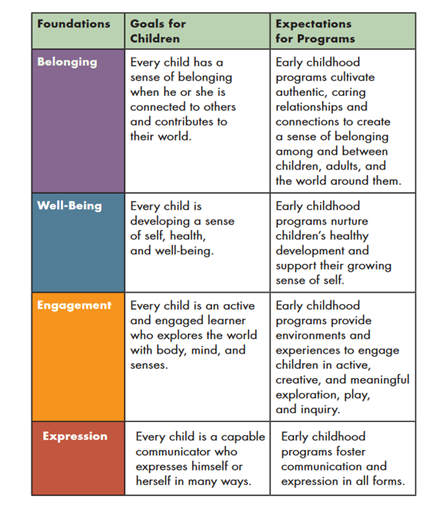How Does Learning Happen?
For parents; written by Julie Bisnath, BSW RSW
Good question! Important too—how can we support learning if we’re not exactly sure how it happens? When does it happen?—what underlying conditions need to be met for successful learning to take place? The Ontario Ministry of Education must have been wondering about these exact questions. In 2014, after extended consultation with community partners, system leaders, experts, professionals, and practitioners from the early years sector and through individual dialogue, local focus groups, and various provincial forums, How Does Learning Happen? Ontario’s Pedagogy for the Early Years was finally developed. It is a professional learning resource guide that addresses and reflects upon that very question: How Does Learning Happen?
The very over-simplified answer? Learning happens within the context of supportive relationships. With kind, compassionate, and attuned adults, children feel calm and ready to learn.
“Evidence from diverse fields of study tells us that children grow in programs where adults are caring and responsive. Children succeed in programs that focus on active learning through exploration, play, and inquiry. Children thrive in programs where they and their families are valued as active participants and contributors.” www.edu.gov.on.ca/childcare/HowLearningHappens.pdf (pg. 4)
How Does Learning Happen? helps educators and home child care providers focus on the interrelationships between the child, the family, and the educator, within the early years environment. It defines strong and positive views of children, families, and educators; outlines four guiding foundations with goals for children and expectations for programs; and prompts questions for reflective practice.
“How Does Learning Happen? sets out goals for children and expectations for programs, organized around four foundations that are central to children’s learning and growth. The goals for children provide a basis for thinking about and creating the kinds of environments and experiences that are meaningful for children. They are not meant to measure children’s development but rather to guide what you do on a daily basis. The expectations for programs provide ideas and examples of what you can do to create environments, experiences, and interactions that support the goals for children in your home child care program.” www.edu.gov.on.ca/childcare/HomeChildCareEn.pdf (pg. 5)
The Four Foundations:

“An Introduction to How Does Learning Happen? Ontario’s Pedagogy for the Early Years–For Home Child Care Providers” outlines many unique opportunities for home child care providers to support how learning happens: (adapted slightly, from pages 7 & 8)
- by being flexible in the daily routines and building on children’s natural curiosity about the world around them;
- by thinking about the home environment and neighbourhood as rich in possibilities for children to learn through exploration, play, and inquiry;
- by enabling children of varied ages to develop strong relationships, learn together, and care about one another;
- by connecting with the community and participating in its programs and accessing its resources (e.g., visiting and using local libraries, recreation centres, parks, and family support programs);
- by having conversations with licensed home child care agency staff (or other home child care providers or other early years professionals—including the staff at CCPRN!) as co-learners in which you ask one another questions and together reflect on the goals for children and expectations for programs;
- by building relationships in which children and families feel secure, and using personal experiences with the children to help the program evolve as the children grow and mature;
- by engaging in self-reflection, and participating in professional learning coordinated by licensed home child care agencies, your municipality, or other early years programs in your community—such as CCPRN.
Questions for reflection:
- How do you view the inter-relationships between your child, your family, and your home child care provider?
- What are each person’s unique strengths and/or experiences—yours, your child’s, and your home child care provider’s?
- Do you feel valued as an active participant and contributor to your child’s home child care program?
- What are your child’s interests?
- How is your home child care provider already supporting the four foundations?
- With regards to your child’s learning, what do you want to know more about? What questions do you have?
As a parent what can you do to support your child’s learning?
Here are some suggestions:
- Learn and understand how the brain develops—how the experiences of early childhood shape the brain and lay the foundation for all future learning:
- Watch the Think, Feel, Act video series to learn about Positive Relationships and Brain Development:
- Read: The Power of Positive Adult Child Relationships: Connection is the Key by Jean M. Clinton: www.edu.gov.on.ca/childcare/Clinton.pdf
- Read the Ministry of Education documents to better understand the resource guide How Does Learning Happen? Ontario’s Pedagogy for the Early Years
- Take advantage of workshops and webinars offered through community agencies such as Child Care Providers Resource Network.
- Ask your home child care provider! What do they need from you as a parent? What can you do to support them in their role? How can you work together to embrace the elements of How Does Learning Happen?
